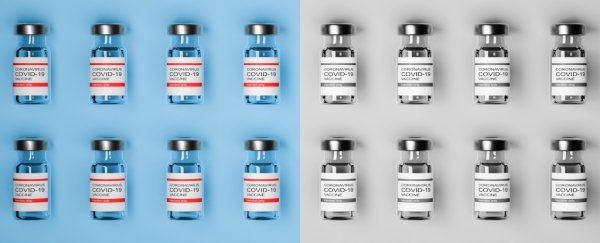
What Would Happen if Rich Countries Gave Away Half Their COVID-19 Vaccines?
DAVID NIELD 1 FEBRUARY 2022New research gives a stark warning to richer nations that have been hoarding their supplies of COVID-19 vaccines: Doing so only has a short-term local benefit, and in the longer term leaves everyone more vulnerable to infection.
Across a five-year model, scientists found that when rich countries gave away 46 percent of their COVID-19 vaccine supply to low and middle-income countries (LMICs), it not only reduced the death rate in those countries but also reduced the risk of new virus strains appearing.
In addition, the sharing of vaccines also limited the number of waves of the pandemic, according to the modeling.
Right now, high-income countries (HICs) have access to most of the available vaccine supply, and are looking to prioritize getting their own populations vaccinated – but as the Delta and Omicron variants have shown, no-one is safe until everyone is safe.
"Our results show that vaccine inequity provides only limited and short-term benefits to HICs," the researchers write in their paper.
"Sharper disparities in vaccine allocation between HICs and LMICs lead to earlier and larger outbreaks of new waves. Equitable vaccine allocation strategies, in contrast, substantially curb the spread of new strains."
The researchers looked at data including the global movement of people, vaccine efficacy, and viral evolutionary dynamics to see how different vaccine distribution patterns would work – including examining scenarios where vaccines were hoarded compared against when they were shared.
While HICs initially see a positive trend from hoarding – in terms of reducing the prevalence of COVID-19 infections and the cumulative mortality rate – the delay in vaccinations in other countries simply prolongs the pandemic.
As well as leading to more deaths in LMICs, this means more time for reinfection, a greater possibility of future waves, and more time for the SARS-CoV-2 virus to develop new strains and reinfect already vaccinated populations.
High-income countries can't protect themselves from those problems crossing their borders, even with a highly vaccinated population. In the end, not sharing vaccines ends up costing more in terms of fighting infections and keeping people healthy.
"Many researchers and public health experts have warned of the negative consequences of global vaccine inequity," the researchers explain. "Pandemics know no borders, and the public health and economic costs of inequitable vaccine allocation will be borne by all countries in the end."
If people need even more convincing, we've already seen from studies carried out with influenza spread that when vaccines are shared between countries, everybody involved benefits from reduced infection rates.
By the end of 2021, 31 different vaccines had been approved by at least one country worldwide, with some 9 billion doses administered (that's around 116 doses for every 100 people on the planet). It's been shown that a strong vaccine response to COVID-19 is possible – but it has to apply everywhere.
Inevitably there is some educated guesswork in modeling like this – it's hard to predict how quickly countries will get people vaccinated, or how stable the supply of drugs will be – but the figures are clear that recovering from the pandemic needs to be a global, cooperative effort from this point on.
"Vaccine donations by high income countries could protect both high income and low income countries," the researchers conclude.
"It is in high income countries' rational self-interests to share vaccines with low income countries before vaccinating their entire population."
The research has been published in Nature Human Behaviour.


comment 0 Comments
more_vert